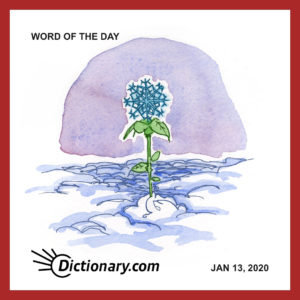Word of the Day
More about nival
The adjective nival comes straight from Latin nivālis “of or belonging to snow, snowy, covered in snow,” a derivative of the noun nix (inflectional stem niv-) “snow.” The adjective is relatively rare, being confined to zoology, botany, and physical geography. Nix is related to English snow, Sanskrit sneha-, Slavic (Polish) śnieg, and Irish snigid “it’s raining.” Nival entered English in the mid-17th century.

how is nival used?
… when the Alpine climbers ascend the snow-clad mountains of picturesque Switzerland and gather a pretty little bouquet of a dozen different nival flowers, on that barren zone ….
The nival region is characterised by accumulating snow deposits, both in the completely nival province where precipitation takes the form solely of snow and the semi-nival province where this is interrupted by rainfall.
euchred
adjective
Australian Informal.
utterly done in or at the end of one's tether; exhausted.
More about euchred
In Australian English euchred has meant “exhausted, destitute” since the second half of the 19th century, a meaning that formerly existed in American English. The sense derives from the card game euchre (originally American) in which, if a player plays a round and fails to take three tricks, they are euchred “done for,” a sense that was extended to “outwitted, outdone, deceived, cheated.” Euchre, the name of the card game, dates from the first half of the 19th century and has no known etymology.
how is euchred used?
You had one water bottle a day for all purposes, and it would be 48 degrees, so we were euchred physically as much as anything else, and it’s very wearing on the mental factor.
My breath comes hard—I’m euchred boy …
pacific
adjective
tending to make or preserve peace; conciliatory: pacific overtures.
More about pacific
The adjective pacific ultimately derives from the Latin adjective pācificus “making peace, peaceable,” a compound derived from pāx (inflectional stem pāc– “peace”) and –ficus, a combining form of the verb facere “to do, make.” In the Vulgate (the late 4th-century Latin version of the Bible, used by the Roman Catholic Church), pācificus as an adjective means “peace-loving,” and as a noun “peace offerings.” The Romans wanted peace like everyone else, but on their own terms. The great Roman historian Tacitus in his Agricola, a biography of his father-in-law, has the British chieftain Calgacus deliver a speech in which Calgacus says of the Romans, … ubi sōlitūdinem faciunt, pācem appellant, “… where they make a desert, they call it peace.” Pacific entered English in the 16th century.
how is pacific used?
My mother was a very calm, pacific individual, and I learned from her to be the same way.
In this way arose the Roman empire, the largest, the most stable, and in its best days the most pacific political aggregate the world had as yet seen.